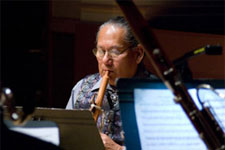Celebrating Cultural Differences through Music

R. Carlos Nakai
1979 BS in Applied Science; 1994 Honorary Doctorate
Northern Arizona University alumnus and Grammy-nominated recording artist R. Carlos Nakai has reached heights that few musicians ever see. During a career that has spanned nearly three decades, Nakai has recorded more than 35 albums, earned two gold records and toured the world many times. He is credited by music industry observers as being a major force in popularizing Native American music among a wider audience. In 2005, Nakai was inducted into the Arizona Music & Entertainment Hall of Fame and in 2009 was featured as an Arizona artist in the Musical Instrument Museum in Phoenix, AZ. Nakai, however, is more than just a successful musician. In fact, he considers himself an educator first, and an advocate of preserving and sharing cultural traditions by collaborating through music.
“The way to lose a culture is when you suddenly put it on a pedestal,” says Nakai. “You lose it because you think you are not good enough and cannot reach it. I’ve had critiques—mainly from younger people—that I shouldn’t be sharing this sacred music from their cultural tradition with people outside the culture. But I’ve had elders coming up to shake my hand and say, ‘We’re really glad you’re doing this because now we won’t disappear.'”
According to Nakai, his journey began in earnest when he arrived at the university in 1966 as a freshman and brass player in the NAU marching band. Though he accumulated some memorable moments—most notably by playing in the Rose Bowl parade—Nakai’s career took a twist when he chose to enlist into the Navy during his sophomore year. In 1975, while working at the Window Rock School District in Fort Defiance, a friend gave him a traditional cedar flute and challenged him to master the instrument. As is evidenced by the widespread success that he has achieved, Nakai was more than up to the challenge.
Eventually, he returned to Flagstaff to earn his degree in 1979. In the years following graduation, he sought the next step in his calling, taking a job with the Heard Museum, a renowned Phoenix-based repository of Native American arts and culture.
“My education at NAU was really helpful in my work at the Heard Museum,” he says. “At the museum, I put together programs that were significant to the natives of the Four Corners. During that project, I was able to use what I had learned at the university and advice from native people in Flagstaff—it all came together.”
Another pivotal transformation occurred for Nakai during his time at the Heard Museum; he began to develop a philosophy that would influence the way he approached music and, ultimately, help propel him to a successful career.
“I found that in America we are all an ancestral mélange of many different cultures all at once,” he says. “As I looked more deeply into it, I found that the American Indian community is also an integral part of it, too. All of this understanding of personality, historic ancestry, and connection to the rest of the world is within us, and I thought there should be a way to teach this to others.”
For Nakai, this inclination toward education became deeply embedded in his approach to music. Though his music is deeply rooted in his ancestral heritage, he is a strong advocate of sharing his traditions and contributing to the multicultural American experience. Nakai regularly performs and records with artists from other musical genres including jazz, and with traditional artists from Asia, Europe and the Pacific.
“There are more similarities than we realize among world communities in music.” he says. “I can share through performing and comparing the application and uses of our traditional music—how it is formed and what its intentions are. In this manner, I can reach more people rather than just explaining it.”
As he reached the pinnacle of his career, Nakai also embraced another role—that of philanthropist. When Nakai learned that Northern Arizona University’s music school was starting a degree program in multicultural music, he and his wife Pam approached the school about creating the R. Carlos Nakai Scholarship. Established in 2006, the scholarship, which is designed for undergraduates who are interested in multicultural activities, world music philosophies, and professional involvement in the world of fine arts, has already supported two students.
“When I was a young person wanting a dream, NAU gave me a leg up,” he says. “I appreciate everything the university has encouraged me to achieve in music and education disciplines. If it weren’t for the support of the faculty, I wouldn’t be doing what I am doing today.”
